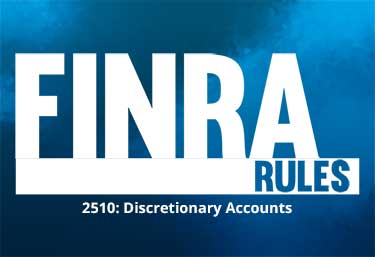
Discretionary accounts are trading accounts in which a broker is empowered with the authority to make individual transactions without seeking client approval. When operating these types of accounts, brokers and brokerage firms must follow industry rules.
Most notably, FINRA Rule 2510 governs how discretionary accounts are to be set up and details some basics standards that brokers must follow when managing these accounts. Here, the experienced FINRA lawyers at Sonn Law Group explain the basics of Rule 2510.
A Customer Must Always Grant Written Authorization
Discretionary accounts need to be set up in the proper manner. Brokers cannot make discretionary trades without first receiving written approval from their client. This written approval must expressly grant the broker the power to conduct discretionary trades. If a financial advisor has not received the proper authority to conduct discretionary transaction, then they must get client approval before making any individual transactions.
The Brokerage Firm Must Approve of the Account
After obtaining written authorization from the customer, a broker must then get the discretionary account approved their member firm. When a brokerage firm approves of one of its brokers operating a discretionary account for a client, that firm will become legally responsible for the account. In other words, if a client loses a substantial amount of money in a discretionary account, because of the negligence of a financial advisor, the brokerage firm could be held liable for their losses.
As firms are responsible for the conduct of their brokers, many brokerage firms develop their own internal policies for establishing discretionary accounts and reviewing the transactions within them. Individual brokers are required to follow their firm’s internal policies, even if those policies are more restrictive than are the standard FINRA rules.
Excessive Trading is Strictly Prohibited
Excessive trading (churning) occurs when a broker or brokerage firm conducts an unreasonable number of trades on a client’s account, Often, this is done simply to increase their own commissions or transaction fees. This type of misconduct will quickly destroy the value of a client’s investment account and it is strictly prohibited under FINRA Rule 2510. Brokers that have discretionary trading authority must avoid conducting trades in a frequency that is inappropriate for the character of the account in question.
Exception: Time and Price Discretion
Finally, there is a small but important exception contained within Rule 2510 that allows customers to grant their brokers limited time and price discretion, without requiring them to establish a discretionary account.
If a customer puts in a trading order for a definite amount of a specific security, then the customer may grant their broker discretion to conduct a trade in that amount until the end of that business day. In this situation, the limited discretionary ability should be marked on the order ticket and no other compliance forms will be needed.
Contact Our Office Today
At Sonn Law Group, our legal team has helped many investment fraud victims recover full and fair compensation for their losses. If you were a victim of investment fraud involving a discretionary account, we can help. Please do not hesitate to call us today at 844-689-5754 to set up your free initial legal consultation.
CONTACT US FOR A FREE CONSULTATION
Se Habla Español
Contact our office today to discuss your case. You can reach us by phone at 844-689-5754 or via e-mail. To send us an e-mail, simply complete and submit the online form below.

